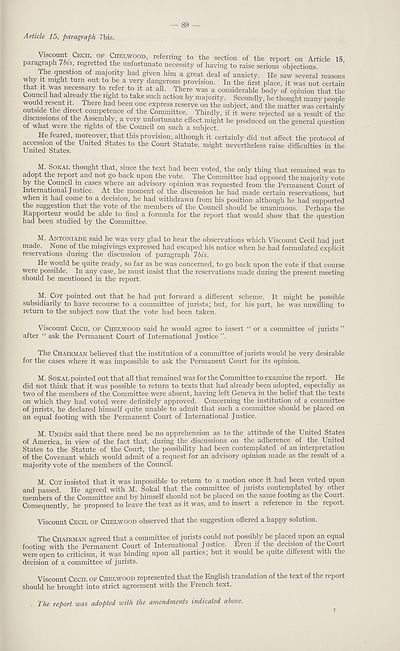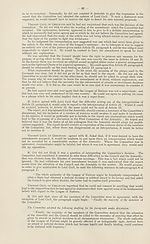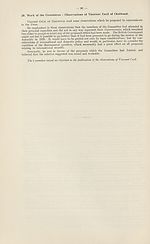Legal > Committee for the amendment of the Covenant of the League of Nations in order to bring it into harmony with the pact of Paris
(93)
Download files
Complete book:
Individual page:
Thumbnail gallery: Grid view | List view

— 89 —
Article 15, paragraph 7bis.
ViSGount CECir, of ChEWOOD, referring to the section of the report on Article 15,
paragraph Ibis,, regretted the unfortunate necessity of having to raise serious objections.
The question of majority had given him a great deal of anxiety. He saw several reasons
why it might turn out to be a very dangerous provision. In the first place, it was not certain
a it was necessary to refer to it at all. There was a considerable body of opinion that the
Council had already the right to take such action by majority. Secondly, he thought many people
wou., r^fn -}■ ' , ere ^ been one express reserve on the subject, and the matter was certainly
ou side the direct competence of the Committee. Thirdly, if it were rejected as a result of the
discussions of the Assembly, a very unfortunate effect might be produced on the general question
of what were the rights of the Council on such a subject.
He feared, moreover that this provision, although it certainly did not affect the protocol of
accession of the United States to the Court Statute, might nevertheless raise difficulties in the
United States.
M. Sokae thought that, since the text had been voted, the only thing that remained was to
adopt the report and not go back upon the vote. The Committee had opposed the majority vote
by the Council m cases where an advisory opinion was requested from the Permanent Court of
International Justice. At the moment of the discussion he had made certain reservations, but
when it had come to a decision, he had withdrawn from his position although he had supported
the suggestion that the vote of the members of the Council should be unanimous. Perhaps the
Rapporteur would be able to find a formula for the report that would show that the question
had been studied by the Committee.
M. Antoniade said he was very glad to hear the observations which Viscount Cecil had just
made. None of the misgivings expressed had escaped his notice when he had formulated explicit
reservations during the discussion of paragraph Ibis.
He would be quite ready, so far as he was concerned, to go back upon the vote if that course
were possible. In any case, he must insist that the reservations made during the present meeting
should be mentioned in the report.
M. Cot pointed out that he had put forward a different scheme. It might be possible
subsidiarily to have recourse to a committee of jurists; but, for his part, he was unwilling to
return to the subject now that the vote had been taken.
Viscount Cecie of Cheewood said he would agree to insert “ or a committee of jurists ”
after “ ask the Permanent Court of International Justice ”.
The Chairman believed that the institution of a committee of jurists would be very desirable
for the cases where it was impossible to ask the Permanent Court for its opinion.
M. Sokae pointed out that all that remained was for the Committee to examine the report. He
did not think that it was possible to return to texts that had already been adopted, especially as
two of the members of the Committee were absent, having left Geneva in the belief that the texts
on which they had voted were definitely approved. Concerning the institution of a committee
of jurists, he declared himself quite unable to admit that such a committee should be placed on
an equal footing with the Permanent Court of International Justice.
M. Unden said that there need be no apprehension as to the attitude of the United States
of America, in view of the fact that, during the discussions on the adherence of the United
States to the Statute of the Court, the possibility had been contemplated of an interpretation
of the Covenant which would admit of a request for an advisory opinion made as the result of a
majority vote of the members of the Council.
M. Cot insisted that it was impossible to return to a motion once it had been voted upon
and passed. He agreed with M. Sokal that the committee of jurists contemplated by other
members of the Committee and by himself should not be placed on the same footing as the Court.
Consequently, he proposed to leave the text as it was, and to insert a reference in the report.
Viscount Cecie of Cheewood observed that the suggestion offered a happy solution.
The Chairman agreed that a committee of jurists could not possibly be placed upon an equal
footing with the Permanent Court of International Justice. Kven if the decision of the Court
were open to criticism, it was binding upon all parties, but it would be quite different with the
decision of a committee of jurists.
Viscount Cecie of Cheewood represented that the English translation of the text of the report
should he brought into strict agreement with the French text.
The report was adopted with the amendments indicated above.
7
Article 15, paragraph 7bis.
ViSGount CECir, of ChEWOOD, referring to the section of the report on Article 15,
paragraph Ibis,, regretted the unfortunate necessity of having to raise serious objections.
The question of majority had given him a great deal of anxiety. He saw several reasons
why it might turn out to be a very dangerous provision. In the first place, it was not certain
a it was necessary to refer to it at all. There was a considerable body of opinion that the
Council had already the right to take such action by majority. Secondly, he thought many people
wou., r^fn -}■ ' , ere ^ been one express reserve on the subject, and the matter was certainly
ou side the direct competence of the Committee. Thirdly, if it were rejected as a result of the
discussions of the Assembly, a very unfortunate effect might be produced on the general question
of what were the rights of the Council on such a subject.
He feared, moreover that this provision, although it certainly did not affect the protocol of
accession of the United States to the Court Statute, might nevertheless raise difficulties in the
United States.
M. Sokae thought that, since the text had been voted, the only thing that remained was to
adopt the report and not go back upon the vote. The Committee had opposed the majority vote
by the Council m cases where an advisory opinion was requested from the Permanent Court of
International Justice. At the moment of the discussion he had made certain reservations, but
when it had come to a decision, he had withdrawn from his position although he had supported
the suggestion that the vote of the members of the Council should be unanimous. Perhaps the
Rapporteur would be able to find a formula for the report that would show that the question
had been studied by the Committee.
M. Antoniade said he was very glad to hear the observations which Viscount Cecil had just
made. None of the misgivings expressed had escaped his notice when he had formulated explicit
reservations during the discussion of paragraph Ibis.
He would be quite ready, so far as he was concerned, to go back upon the vote if that course
were possible. In any case, he must insist that the reservations made during the present meeting
should be mentioned in the report.
M. Cot pointed out that he had put forward a different scheme. It might be possible
subsidiarily to have recourse to a committee of jurists; but, for his part, he was unwilling to
return to the subject now that the vote had been taken.
Viscount Cecie of Cheewood said he would agree to insert “ or a committee of jurists ”
after “ ask the Permanent Court of International Justice ”.
The Chairman believed that the institution of a committee of jurists would be very desirable
for the cases where it was impossible to ask the Permanent Court for its opinion.
M. Sokae pointed out that all that remained was for the Committee to examine the report. He
did not think that it was possible to return to texts that had already been adopted, especially as
two of the members of the Committee were absent, having left Geneva in the belief that the texts
on which they had voted were definitely approved. Concerning the institution of a committee
of jurists, he declared himself quite unable to admit that such a committee should be placed on
an equal footing with the Permanent Court of International Justice.
M. Unden said that there need be no apprehension as to the attitude of the United States
of America, in view of the fact that, during the discussions on the adherence of the United
States to the Statute of the Court, the possibility had been contemplated of an interpretation
of the Covenant which would admit of a request for an advisory opinion made as the result of a
majority vote of the members of the Council.
M. Cot insisted that it was impossible to return to a motion once it had been voted upon
and passed. He agreed with M. Sokal that the committee of jurists contemplated by other
members of the Committee and by himself should not be placed on the same footing as the Court.
Consequently, he proposed to leave the text as it was, and to insert a reference in the report.
Viscount Cecie of Cheewood observed that the suggestion offered a happy solution.
The Chairman agreed that a committee of jurists could not possibly be placed upon an equal
footing with the Permanent Court of International Justice. Kven if the decision of the Court
were open to criticism, it was binding upon all parties, but it would be quite different with the
decision of a committee of jurists.
Viscount Cecie of Cheewood represented that the English translation of the text of the report
should he brought into strict agreement with the French text.
The report was adopted with the amendments indicated above.
7
Set display mode to:
![]() Universal Viewer |
Universal Viewer | ![]() Mirador |
Large image | Transcription
Mirador |
Large image | Transcription
Images and transcriptions on this page, including medium image downloads, may be used under the Creative Commons Attribution 4.0 International Licence unless otherwise stated. ![]()
| League of Nations > Legal > Committee for the amendment of the Covenant of the League of Nations in order to bring it into harmony with the pact of Paris > (93) |
|---|
| Permanent URL | https://digital.nls.uk/191510021 |
|---|
| Shelfmark | LN.V |
|---|
| Description | Over 1,200 documents from the non-political organs of the League of Nations that dealt with health, disarmament, economic and financial matters for the duration of the League (1919-1945). Also online are statistical bulletins, essential facts, and an overview of the League by the first Secretary General, Sir Eric Drummond. These items are part of the Official Publications collection at the National Library of Scotland. |
|---|---|
| Additional NLS resources: |
|

